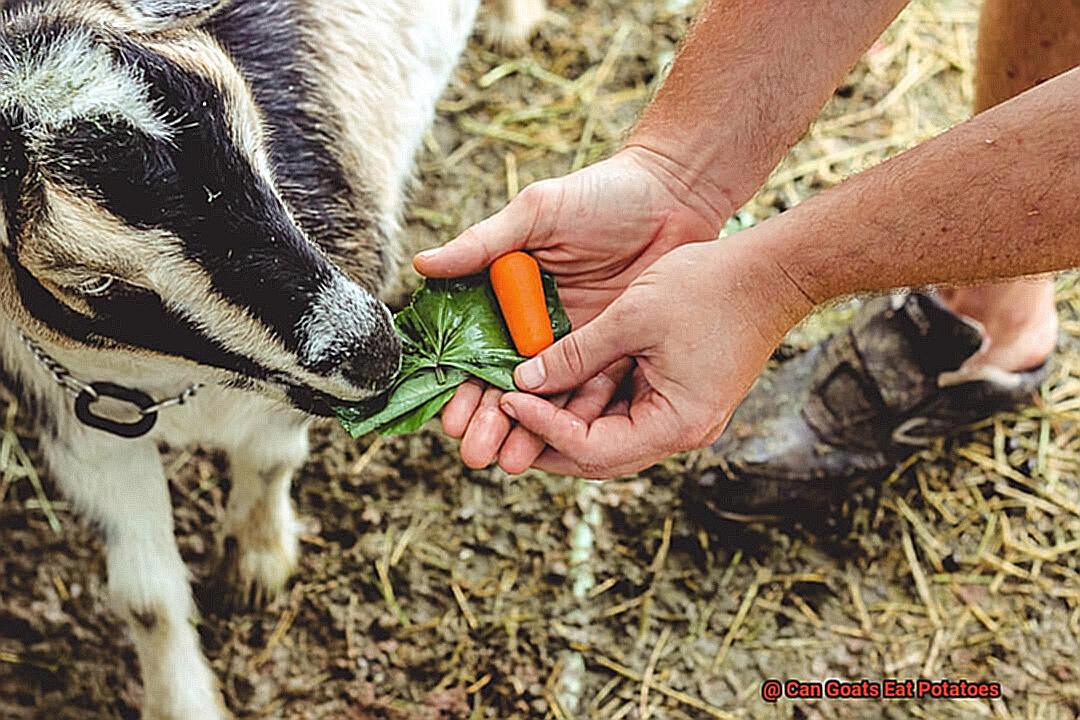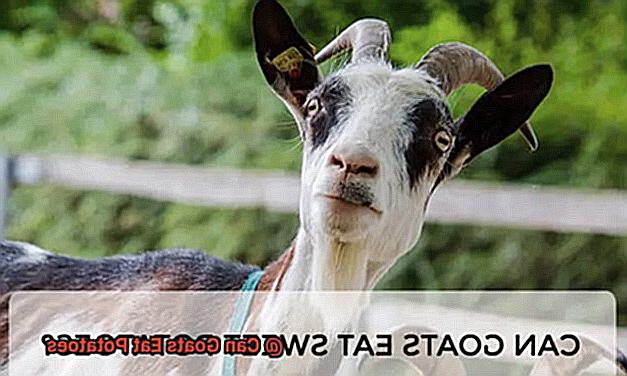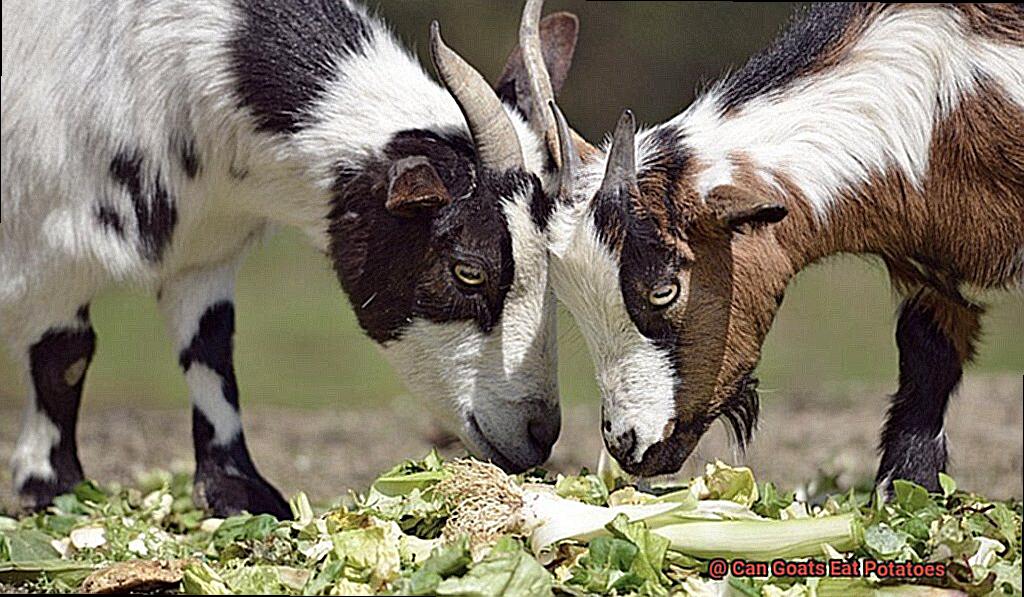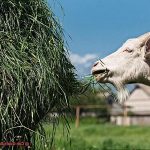As a goat owner, you’re no stranger to the sight of your goats munching on just about anything in their path. From hay to grain to shrubs and even clothing, these curious creatures have a reputation for being voracious eaters. But when it comes to potatoes, can goats really eat them?
You might assume that because goats are such adaptable creatures, they can consume just about anything humans do, including potatoes. After all, potatoes are a staple food for us, so why wouldn’t they be safe for our beloved goats? However, the truth is far from this assumption.
Potatoes contain a toxic compound called solanine that can be harmful to goats and other livestock. While goats technically can consume potatoes, it’s not recommended due to the potential dangers associated with solanine toxicity. In small amounts, solanine can cause digestive issues and discomfort in goats. Still, in larger amounts, it can be lethal.
In this blog post, we’ll delve deeper into the question of whether or not goats can eat potatoes. We’ll explore the risks and potential dangers associated with feeding potatoes to goats while providing alternative foods that are safe and nourishing for these delightful animals.
So, if you’ve been considering adding potatoes to your goat’s diet or wondering whether they’re safe for consumption by these curious creatures – read on.
Discover the truth about this starchy vegetable and how it affects your goat’s health in this informative guide.
What are Goats?
Contents
Let’s delve into what they are and their preferred diet. Goats are domesticated mammals belonging to the Bovidae family, which also includes sheep and cattle. With a four-chambered stomach, goats can effectively digest a wide range of plant materials that other livestock animals cannot.
Goats were historically kept for their meat, milk, and wool. Nowadays, goats have become popular for their ability to manage vegetation in areas like farms and parks, as well as being beloved pets. These hardy animals can thrive in various environments and climates.
Unlike other livestock animals that graze on grasses, goats are browsers that prefer woody plants, leaves, and twigs. However, they will consume grasses if available. Their complex digestive system consisting of a rumen, reticulum, omasum, and abomasum allows them to digest various plants.
Many goat owners often wonder if their goats can eat potatoes. The answer is not straightforward as it depends on several factors. Raw potatoes contain solanine, which is toxic when consumed in large amounts and may cause digestive issues in goats. Cooked potatoes are safe to give in moderation as part of a balanced diet as they do not contain solanine.

It’s essential to note that potatoes are high in starch and carbohydrates that can cause bloating and other digestive issues if given in large amounts. Therefore, incorporating potatoes into a balanced diet that includes forage and hay is crucial.
Can Goats Eat Potatoes?
While potatoes are a staple food consumed worldwide, the answer to whether goats can eat them is a bit more complicated than a simple yes or no.
Goats are ruminants, meaning they have a four-chambered stomach that allows them to break down and digest tough plant materials. However, their digestive system is sensitive to certain foods, and potatoes fall under this category.

Potatoes contain solanine, a toxic compound that can cause severe digestive distress if ingested in large quantities. It’s found in the green parts of the potato, including the leaves, stem, and unripe fruit. As such, it’s crucial to ensure that your goats do not have access to any potato plants growing in their grazing area.
Luckily, cooked potatoes are generally safe for goats to consume in moderation. The cooking process eliminates most of the solanine content, making them less harmful. However, it’s important to remember that potatoes should only be given as an occasional treat and not as a regular part of their diet.
So, can goats eat raw or green potatoes? Absolutely not. Raw potatoes contain high levels of solanine that can cause severe digestive issues such as bloating, diarrhea, and abdominal pain. Green potatoes also have high solanine levels and can cause similar health problems in goats.

Raw Potatoes and Solanine Toxicity
However, not all human foods are safe for goats to consume, and potatoes are no exception. While it may be tempting to feed them whatever leftovers you have lying around in the kitchen, it’s important to understand the potential risk of solanine toxicity associated with raw potatoes.
Solanine is a toxic substance that occurs naturally in potatoes and can cause health problems in both humans and animals if consumed in large amounts. Raw potatoes contain higher levels of solanine than cooked potatoes, which means that feeding raw potatoes to goats can be dangerous.
If you’re planning to give your goats potatoes, it’s crucial to ensure that they are cooked thoroughly to reduce the risk of solanine poisoning. Different types of potatoes have varying levels of solanine; some varieties, such as Russet potatoes, have higher levels than others like sweet potatoes. Therefore, it’s essential to research the type of potato you plan to feed your goats and ensure that it’s safe for consumption.
Symptoms of solanine toxicity in goats include diarrhea, vomiting, abdominal pain, and lethargy.
In severe cases, it can even lead to death. Therefore, limiting their potato intake and making sure that they are not the primary source of their diet is crucial.
Goats require a balanced diet with a variety of nutrients, and potatoes should only be given as a treat or supplement.
Cooked Potatoes for Goats
While it might seem like a harmless snack, it’s important to understand that cooked potatoes should not make up a significant portion of their diet. Here’s why:
Goats are unique creatures with a special digestive system that allows them to extract nutrients from tough plant materials. While cooked potatoes are not toxic to goats, their digestive systems are not designed to handle large amounts of starchy foods like potatoes. Overfeeding your goats cooked potatoes can lead to digestive problems like bloating or diarrhea.
If you do choose to feed your goats cooked potatoes, it’s vital that they are fully cooked and properly prepared. Raw or undercooked potatoes can be difficult for goats to digest and may cause digestive upset. Additionally, potato skins and green potatoes should be avoided as they contain harmful toxins.
When offering cooked potatoes to your goats, it’s best to treat them as a special snack in small quantities. You can mix them in with other healthy treats like fruits and vegetables or even add them to their regular feed as a supplement. However, keep in mind that potatoes are high in carbohydrates and should not be fed in excess.
As with any new food, it’s always best to introduce cooked potatoes slowly and monitor your goats for any signs of digestive upset.
Potential Health Risks of Feeding Potatoes to Goats
While goats may love the occasional potato treat, it’s important to be aware of the dangers associated with this starchy food.
Firstly, potatoes contain a toxin called solanine, which can be harmful to goats when consumed in large quantities. This toxin is found in the leaves, stems, and unripe potatoes of the potato plant. If your goats consume too much solanine, it can cause digestive problems like bloating, diarrhea, and even death.
Additionally, potatoes are high in starch, which can cause digestive issues for goats if not balanced with fiber-rich foods. Overfeeding your goats with potatoes can lead to digestive upset and discomfort.
Furthermore, feeding your goats large chunks of potatoes can pose a choking hazard. Goats tend to swallow their food whole, and potatoes are a hard and dense food that can get stuck in their throat or esophagus.
While cooked potatoes are generally safer for goats to consume as the cooking process reduces the levels of solanine in the potato, it’s still important to limit the amount of potatoes given to goats and monitor their intake closely.
Incorporating Potatoes into a Balanced Diet
Look no further than potatoes. However, it’s important to remember that while potatoes are a nutritious treat, they should only make up a small portion of your goat’s daily intake and should be prepared properly.
Firstly, it’s crucial to note that potatoes should not be the main component of your goat’s diet. Instead, they should be used as a supplement or treat and make up no more than 10% of their daily intake. This is because potatoes are high in starch which can cause digestive issues for goats if consumed in large quantities. So, to avoid any digestive issues, it’s best to cook the potatoes before feeding them to the goats. Cooking breaks down some of the starch and makes them easier to digest.
It’s important to keep in mind that green potatoes or potato skins should be avoided as they contain solanine which is toxic to goats. Also, any rotten or spoiled potatoes should be discarded as they can cause illness in goats.
When feeding potatoes to goats, it’s best to offer them in small quantities and alongside other nutritious foods such as hay, fresh vegetables, and grains. This will ensure that goats are receiving a balanced and varied diet that meets their nutritional needs.
e6Kf47XKz5Q” >
Conclusion
To wrap things up, goats may seem like they can munch on anything without consequence, but it’s critical to exercise caution when feeding them potatoes. The presence of solanine in raw and green potatoes can be hazardous for goats and can lead to severe digestive complications or even fatal outcomes if consumed in large quantities. However, cooked potatoes are generally safe for goats to consume as long as it’s done in moderation and as part of a well-rounded diet.
It’s important to note that potatoes should not make up the bulk of a goat’s diet due to their high starch and carbohydrate content, which can result in bloating and other digestive problems. Instead, they should be used sparingly as supplements or occasional treats alongside other nutritious foods like fresh vegetables, grains, and hay.
As responsible goat owners, it is crucial to seek advice from a veterinarian or experienced goat breeder before making any significant changes to their diet. It is also essential to keep an eye on their behavior and health when introducing new foods into their diet.
In conclusion, while goats are capable of eating potatoes, it’s vital to consider the type of potato and the amount consumed. Cooked potatoes are acceptable for goats in moderation, but raw or green potatoes should be avoided at all costs.






